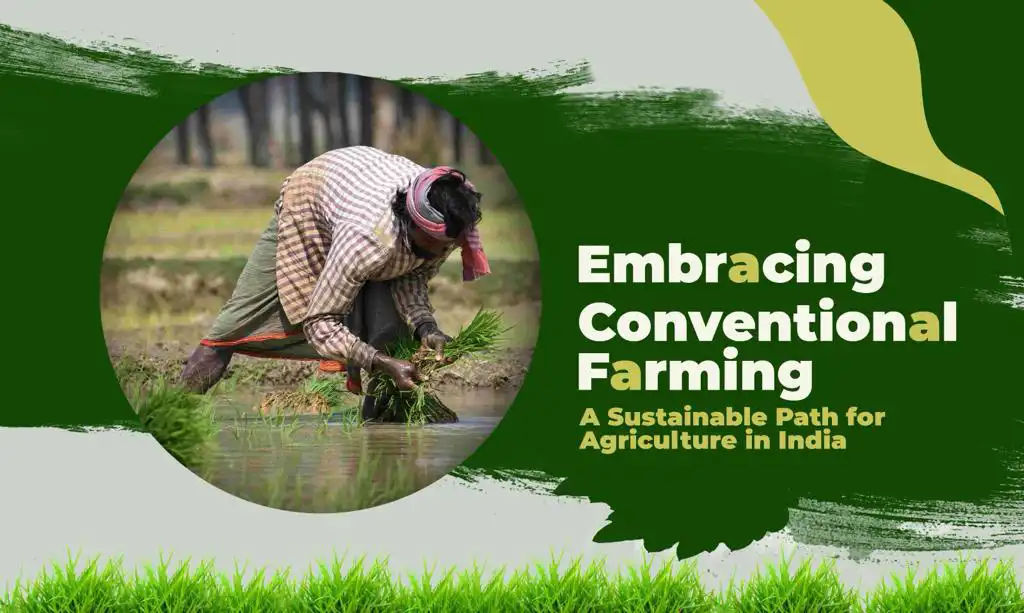Embracing Conventional Farming: A Sustainable Path for Agriculture in India

India's economy has been based on agriculture for millennia, feeding and supporting millions of people. Even though contemporary agricultural methods have significantly increased yields and efficiency, there is rising worry about their effects on the environment. In this setting, traditional farming is receiving increasing interest as a more environmentally responsible and sustainable option. This blog examines conventional farming as a concept and considers how it may be used in India.
What is Conventional Farming?
Conventional farming, also known as traditional or organic farming, represents a farming approach that relies on age-old techniques and principles to cultivate crops and raise livestock. Unlike modern industrial farming, which is characterized by the heavy use of synthetic chemicals and machinery, conventional farming emphasizes natural processes and sustainable methods.
Key principles of conventional farming include:
Crop Rotation : Crop rotation is a technique used by conventional farmers to preserve soil fertility and lessen pest and disease loads in your agriculture farmland. With this method, the crops planted in a specific field are changed throughout time. Natural Pest Control: Conventional farmers use natural approaches like companion planting, which is growing crops that are mutually beneficial to ward off pests, as an alternative to chemical pesticides. Organic Fertilizers: Compost and manure are used most frequently in conventional farming to improve the soil and give plants the nutrients they need. No Genetic Modification: Genetically modified organisms (GMOs) are forbidden in conventional farming for both crops and cattle.Implementing Conventional Farming in India
A prime choice for implementing conventional farming methods in India is because of its diverse agriculture farmland environment. To apply conventional farming in India, follow these steps:
Education and Training : Introduce thorough training programs to teach farmers about traditional farming practices, such as crop rotation, organic fertilization, and natural pest management. To plan seminars and supply resources, NGOs and government agricultural departments can cooperate. Promote Sustainable Practices : Encourage the adoption of sustainable techniques by farmers by offering incentives. Provide financial assistance or subsidies to individuals who switch from chemical-intensive farming practices to conventional ones. Encourage the creation of local composting facilities and the use of organic fertilizers. Research and Development: Make research and development investments to modify conventional farming methods to the needs of various Indian locations. To enhance productivity and sustainability, India's diverse soil types and climate call for region-specific strategies. Certification and Market Access: Create a certification program for both conventional and organic goods. Farmers will be able to reach premium markets both domestically and abroad, where customers are increasingly looking for fruit that is free of pesticides and the environment. Community Support: Encourage the development of networks in your community where farmers can share information and tools for conventional farming. Encourage the creation of farmer cooperatives to make it easier to purchase organic inputs in bulk and market products collectively.Getfarms: Your Partner in Implementing Conventional Farming
Access to resources and information is one of the biggest obstacles for Indian farmers trying to switch to traditional farming. Here, Getfarms enters the picture. Getfarms is a ground-breaking platform that links farmers with experts, tools, and marketplaces to make adopting conventional farming practices simpler than ever.
How Getfarms Can Help:
Expert Guidance: Expert Advice Getfarms connects farmers with a network of industry professionals who can provide individualized advice and direction on using traditional farming practices. Resource Access: Access to Resources Farmers may find affordable organic fertilizers, seedlings, and other inputs needed for conventional farming at Getfarms. To cut expenses, the site also makes group purchasing possible. Market Access: Getfarms links producers with domestic and foreign markets that are interested in buying organic and sustainably produced goods. This creates additional revenue streams and market diversification opportunities. Building Community: Getfarms encourages a feeling of community among farmers by enabling them to discuss their accomplishments, struggles, and experiences. This feeling of unity can be a powerful inspiration and support system.Conventional farming promises that it will lead to a more environmentally responsible and sustainable method of agriculture in India. Indian farmers may lessen their dependence on synthetic chemicals, enhance soil health, and support a better environment by using time-tested practices and principles. The adoption of traditional farming is made more feasible with the aid of programs like Getfarms, providing a more promising and environmentally friendly future for Indian agriculture. It's time for Indian farmers to explore conventional farming's potential and make use of its advantages for themselves, their communities, and the environment.
Latest Blog
JOIN OUR COMMUNITY !
Stay connected with Getfarms! Follow us on social media for the latest updates, exclusive offers, and a glimpse into the world of farmhouse living. Join our community today














